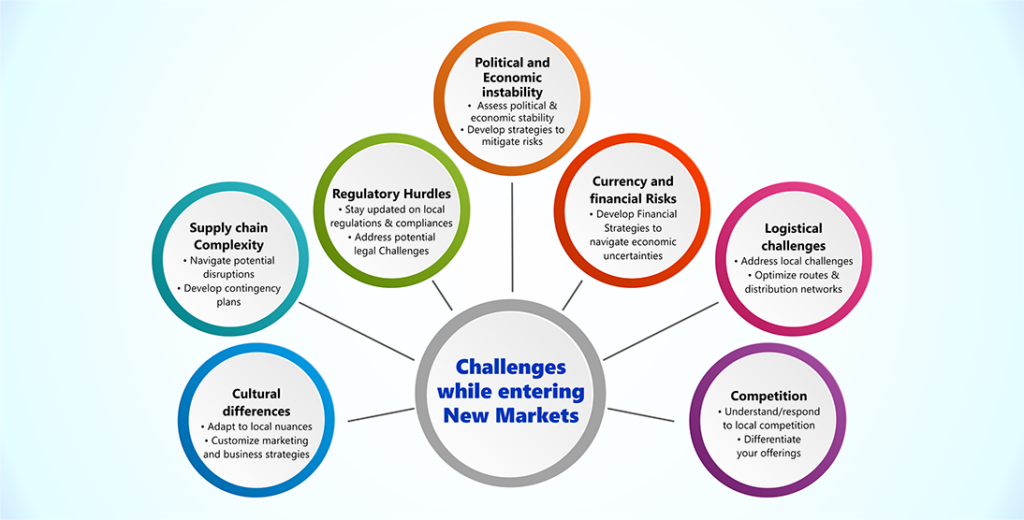A global expansion strategy to expand to a new market and set foot overseas is an obvious part of a company’s growth story. Companies that refrain or delay from entering new markets risk are missing out on significant growth opportunities, diversification, and resilience. Staying confined to familiar markets might result in stagnation and limitation on the potential for learning from different business environments. In a globalized economy, where consumer demands and market dynamics are evolving rapidly, failing to explore new territories may hinder a company’s ability to stay competitive, adapt to changing trends, and sustain long-term success.
Growth is one of the crucial aspects of any company’s expansion strategies that can open avenues for increased revenue streams, customer bases, and market share. By tapping into diverse markets, companies can also reduce dependency on specific regions and better withstand economic fluctuations or geopolitical uncertainties. Furthermore, entering new markets allows access to fresh talent, resources, and innovative technologies that may be prevalent in those regions.
However, expanding businesses certainly face their fair share of challenges. There are international business risks inherent in this ambitious pursuit that can significantly impact a company’s trajectory, influencing its strategic decisions and bottom line. Navigating these complexities can be a formidable task. Successfully addressing these challenges not only defines the success of market expansion but also shapes the resilience and longevity of the company in a globalized business landscape. Here are a few for the curious ones:
Market Study
Thorough research is essential to understand the culture, preferences, consumer behaviour, and competition in a new market, especially in unexplored territories. Key areas such as local infrastructure, the competitive environment, political and social stability, and economic factors demand comprehensive investigation for successful brand awareness and market entry. This research will empower new companies to craft robust strategies for global expansion.
Regulatory and Legal Considerations
Navigating unique laws, regulations, and compliance standards encompassing trade restrictions, licensing requirements, permits, taxes, and labour rules are imperative for businesses aiming global expansion. Adapting to and understanding the legal landscape ensures companies navigate regulatory challenges and establish a solid foundation for sustainable growth in unfamiliar territories.
Sustainability Regulations
Local sustainability regulations such as the European Green Deal in EU and the emissions trading system in China can influence newbies environmental practices, resource management, and overall corporate responsibility. Adhering to these regulations is essential for building trust with local stakeholders, meeting consumer expectations, and fostering sustainable business practices in diverse geographical contexts.
Talent Acquisition
It is difficult to build a skilled and diverse workforce in a new country. To find talent with expertise, knowledge of labour laws and employment practices, is crucial. Cultural variations could call for modifications to hiring, training, and management procedures.
Financial Investment & ROI
Investing heavily in new markets necessitates paying for infrastructure, market entry fees, marketing costs, and hiring new people. Ensuring sustainable expansion requires diligent ROI calculation and effective cash flow management. Fundable, CircleUp, AngelList, Seedrs, Crowdcube, and Alibaba’s investment platform are just a few of the platforms that connect companies with investors while also offering data, contacts, and tools for raising funds globally.
Insurance Mandate
Navigating diverse insurance regulations poses challenges for meeting coverage standards. Neglecting insurance commitments can lead to penalties and legal consequences. Countries like Germany, UK and Australia are very particular about their mandates.
Cost/Margin Implications
Companies entering new geographies must have agile business strategies. One such aspect is a careful analysis needed to manage financial effects of a new market, including market entry fees, infrastructure setup, and pricing strategies. Instability in the financial situation, decreased margins, or inability to compete might result in underestimating expenses or establishing unrealistic price structures.
Tax obligations
A careful consideration of the tax obligations is a necessity as entrants encounter diverse regulations, rates, and structures. Adapting to international tax rules and consulting with local experts can help navigate this complex landscape. Addressing these tax requirements proactively ensures compliance and financial stability.
Immigration Laws
Understanding and navigating immigration laws are essential to ensure compliance and seamless integration of international personnel. Adapting to local immigration regulations makes way for a smooth and efficient entry into diverse markets.
Infrastructure and Logistics
The efficiency of infrastructure and logistics profoundly impacts distribution, supply chain, and operational costs. Entrants must adapt their logistics strategies to local conditions and transportation networks. Access to reliable transportation, communication networks, and storage facilities is crucial, and so is the need to strategically assess and adapt to the infrastructure landscape of new markets to optimize logistical efficiency and ensure a competitive edge.
The Complex Tapestry of Challenges in Market Expansion
Global expansion strategies pose multifaceted challenges for companies, encompassing cultural nuances, regulatory hurdles, and fierce competition. Adapting products and strategies to unfamiliar landscapes demands cultural intelligence, cross-cultural collaboration and intercultural communication. Successful market entry requires companies to navigate challenges with strategic foresight, innovation, and a commitment to building sustainable relationships. Remember, the specific challenges can vary based on the industry, location, and the nature of the supply chain business.

Create Your Blueprint for Success in the New Markets
Businesses can manage the difficulties, reduce risks, and raise the possibility of a successful expansion by being proactive and meticulous about the variables. One such example is the success story of Acuver Consulting and its cross-cultural expansion within a few years of its inception. Acuver has successfully engaged with local and international partners that aided in mitigating these issues and ensured a successful global expansion.
Conquer New Frontiers with Strategic, Global Expansion Strategies
In the current dynamic landscape of cross-cultural collaboration, companies must not only recognize the prerequisites for entering new markets but also tackle the inherent international business risks involved in this complex journey, head-on. Armed with strategic foresight, thorough research, and a commitment to innovation, it is possible to transform challenges into opportunities. By fostering adaptability, leveraging technology, and forming local partnerships, businesses can chart a course for sustainable growth and success in unfamiliar territories. The key to triumph can be found in a proactive approach, continuous learning, and an unwavering commitment to meeting the demands of the new, target market.
Author – Saakshi Sinha
Subscribe to our blog and stay updated!
Share This Story, Choose Your Platform!





